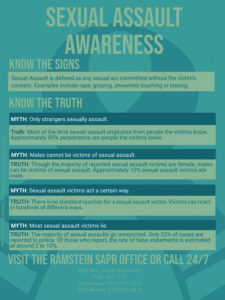Even during the coronavirus disease 2019 pandemic the Sexual Assault Prevention and Response office is finding ways to raise awareness.
Not unlike other agencies, the SAPR office canceled many of their public events in April to comply with physical distancing standards.
But in the spirit of innovation, the office created virtual events on their Facebook page and collaborated with other agencies during the month to ensure a presence among the base populace.
According to Kelly Dominguez, Sexual Assault Response Coordinator lead, COVID-19 has not changed SAPR’s mission: it has only changed the vehicle through which support is provided.
The SAPR office altered its response to sexual assault victims to adhere to new restrictions and guidelines while still being available to those in need. Prior to COVID-19, volunteer victim advocates from the Landstuhl Regional Medical Center would respond to sexual assault victims. To decrease the risk of exposure, SAPR employees now respond in their place, said Mary Ann Lobdell, installation victim advocate.

Another way the SAPR office is educating the public about sexual assault is discussing infamous sexual assault myths and their corresponding truths.
One myth is perpetrators of sexual assault are strangers to the victim. The reality is many sexual assault crimes are committed by people the victim knows. According to the Rape, Abuse and Incest National Network (RAINN), 80 percent of perpetrators are someone the victim is familiar with.
Another myth is victims of sexual assault cannot be male. The truth is while many victims of sexual assault are female, there are also many male victims. Approximately 10 percent of sexual assault victims are male, according to RAINN.
A third myth is most sexual assault victims lie when reporting an incident. The National Sexual Violence Resource Center found only about 2-10 percent of reported cases as false in their studies. Furthermore, the vast majority of sexual assaults go unreported, with RAINN determining that only 23 percent of sexual assaults are reported to police.
Moreover, many victims have to go through a long process to receive a court date for their case. This would include a forensic exam, an investigation and recalling their sexual assault many times.
“Why would an individual put themselves through bad trauma for something that is not true?” asked Lobdell.
A fourth myth is that sexual assault must be violent in nature. The reality is that sexual assault can occur in many nonviolent situations. Examples of sexual assault can be rape, groping, sexual harassment, unwanted touching or kissing.
Even during COVID-19, the SAPR office remains available.
“No question is too small,” said Dominguez. “No time’s too late or too early.”
The SAPR office is located at building 404 and is open Monday through Friday from 8 a.m. to 4 p.m. Their office can be reached at DSN 480-7272 or commercially at 0637-147-7272. The 24/7 hotline number is 0172-821-4871.


